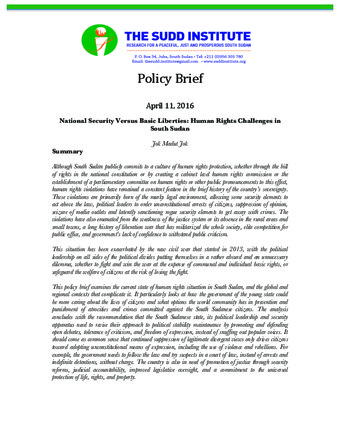National Security Versus Basic Liberties: Human Rights Challenges in South Sudan
Publication Summary
Although South Sudan publicly commits to a culture of human rights protection, whether through the bill of rights in the national constitution or by creating a cabinet level human rights commission or the establishment of a parliamentary committee on human rights or other public pronouncements to this effect, human rights violations have remained a constant feature in the brief history of the country’s sovereignty. These violations are primarily born of the murky legal environment, allowing some security elements to act above the law, political leaders to order unconstitutional arrests of citizens, suppression of opinion, seizure of media outlets and latently sanctioning rogue security elements to get away with crimes. The violations have also emanated from the weakness of the justice system or its absence in the rural areas and small towns, a long history of liberation war that has militarized the whole society, elite competition for public office, and government’s lack of confidence to withstand public criticism.
This situation has been exacerbated by the new civil war that started in 2013, with the political leadership on all sides of the political divides putting themselves in a rather absurd and an unnecessary dilemma, whether to fight and win the war at the expense of communal and individual basic rights, or safeguard the welfare of citizens at the risk of losing the fight.
This policy brief examines the current state of human rights situation in South Sudan, and the global and regional contexts that complicate it. It particularly looks at how the government of the young state could be more caring about the lives of citizens and what options the world community has in prevention and punishment of atrocities and crimes committed against the South Sudanese citizens. The analysis concludes with the recommendation that the South Sudanese state, its political leadership and security apparatus need to revise their approach to political stability maintenance by promoting and defending open debates, tolerance of criticism, and freedom of expression, instead of snuffing out popular voices. It should come as common sense that continued suppression of legitimate divergent views only drives citizens toward adopting unconstitutional means of expression, including the use of violence and rebellions. For example, the government needs to follow the law and try suspects in a court of law, instead of arrests and indefinite detentions, without charge. The country is also in need of promotion of justice through security reforms, judicial accountability, improved legislative oversight, and a commitment to the universal protection of life, rights, and property.
Jok Madut Jok is trained in the anthropology of health and holds a Ph.D. from the University of California, Los Angeles (UCLA). He is a fellow of Rift Valley Institute and Director of the Sudd Institute. Jok has held fellowship positions at a number of other institutions, including the United States Institute of Peace and the Woodrow Wilson International Center for Scholars. He also served in the Government of South Sudan as undersecretary in the Ministry of Culture and Heritage for three years. He has also worked in aid and development and author of four books and numerous articles covering gender, sexuality and reproductive health, humanitarian aid, ethnography of political violence, gender-based violence, war and slavery, and the politics of identity in South Sudan and Sudan. His book Breaking Sudan: The Search for Peace, was published in 2017 by OneWorld.

